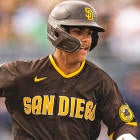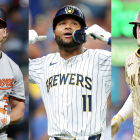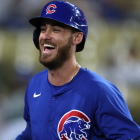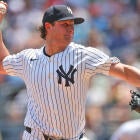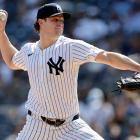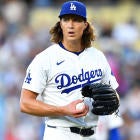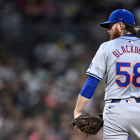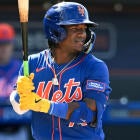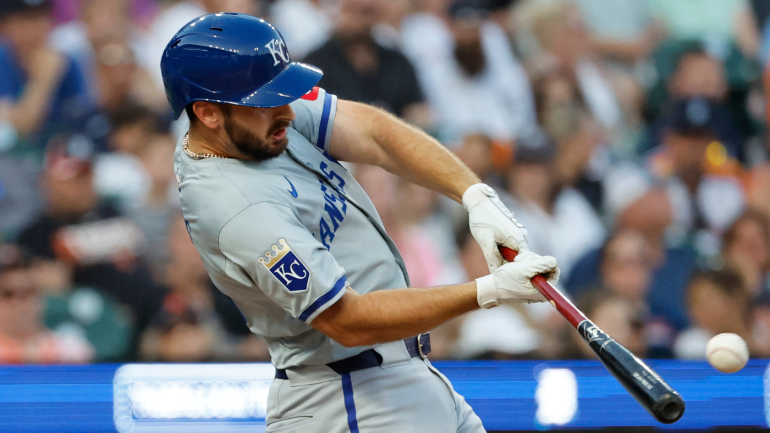
Exactly one month ago, July 30, was the MLB trade deadline. It was the last chance for contending teams to upgrade their rosters and for rebuilding teams to flip veterans for prospects. The old saying is you use the first third of the season to evaluate your team, the middle third to make changes, and the final third to ride out those changes. We're firmly in the "ride it out" period now.
This year's trade deadline was busy, albeit with no real blockbusters. There was a lot of minor shuffling and very little overhauling. Inevitably, some deadline moves have worked out better than others. Now that we're a month out, here's a look at the contending teams that did the best (and worst) jobs improving their rosters before July 30.
Nailed it: Royals
The Royals are 16-11 since the July 30 trade deadline and have climbed from 6 1/2 games back in the AL Central to only 1 1/2 games back. Their deadline additions have had a big hand in this August surge. To a man, they've all been great.
IF Paul DeJong: Going from the White Sox, the worst team in baseball (and maybe ever), to a team in the postseason race can revitalize a veteran player. That appears to have happened with DeJong, who is now playing third base, a position he'd never played prior to 2024. DeJong has given Kansas City a .910 OPS and five homers in 21 games. Prior to August, the Royals got a .645 OPS and close to replacement-level production from their third basemen. Will DeJong continue at this pace? No, probably not, but that doesn't matter. What he's done is already in the bank and it's helped the Royals win games.
RHP Lucas Erceg: Since coming over from the Athletics, Erceg has moved into a "Moment of Truth" role and has pitched in the most important situations. He's entered games in the sixth, seventh, eighth, and ninth innings. Four times he's gotten four or more outs. He's entered with runners on base six times and in only one of those six games did he allow inherited runners to score. Erceg got roughed up Thursday night (three runs and one out), but, before that, he'd allowed one run in 13 1/3 innings with 16 strikeouts and one walk. He's been outstanding with the Royals and manager Matt Quatraro has put on a masterclass in using Erceg in the highest-leverage situations.
RHP Michael Lorenzen: Lorenzen exited his last start in the second inning with a hamstring strain after he slipped covering first base, and it's bad enough to send him to the injured list. That's unfortunate. In his first four starts with the Royals, Lorenzen had a 1.99 ERA and three times went at least 5 2/3 innings with no more than one run allowed. The Royals did not need a top-of-the-rotation starter. They have Cole Ragans and Seth Lugo fronting the staff. They needed someone to stabilize the back of the rotation and give innings, and Lorenzen did that and then some prior to this week's hamstring injury.
Kansas City's deadline miss is Hunter Harvey, who was acquired on July 14 and allowed four runs in 5 2/3 innings before landing on the injured list with back tightness. You can't win 'em all. Even with Harvey, the Royals knocked it out of the park at the deadline. Erceg is a difference-making, high-leverage reliever, DeJong's been a big upgrade at the hot corner, and I bet even the Royals would admit they didn't expect Lorenzen to be this good. One month later, they are the big deadline winners.
Going according to plan: Diamondbacks and Dodgers
The two NL West rivals were among the busiest teams at the deadline. The Dodgers brought in Jack Flaherty as a badly needed starter and he has 3.49 ERA through five starts, though home runs have been a bit of an issue. Still, he's been an upgrade to a rotation that needed one. Their big deadline win is Michael Kopech, who instantly became the kind of high-leverage monster the Dodgers hoped he would be: 19 strikeouts and one run allowed in 13 1/3 innings. Kopech came over from the White Sox and his in-season turnaround is a classic case of some teams just being better and smarter than others.
Los Angeles also overhauled their bench with Tommy Edman, Kevin Kiermaier, and Amed Rosario. Rosario has already been dumped on waivers and Edman returned from offseason wrist surgery (and an ankle issue) last week. He was injured at the time of the trade and the Dodgers were willing to wait for him. Kiermaier was brought in to simply catch the ball in center field. The Dodgers don't need him to hit and his glove is as good as it's ever been. Flaherty has been solid, Kopech has dominated, Kiermaier is doing what the Dodgers need him to do, and Edman is rounding into form. Everything is going according to plan here.
As for the Diamondbacks, A.J. Puk has been outstanding since coming over from the Marlins. He's struck out 20 batters in 13 2/3 innings of one-run ball, and he's already gotten a lot of high-leverage outs. Josh Bell was brought in at the last minute to replace Christian Walker, who pulled his oblique the day before the deadline. Bell has slugged four homers and put up a .796 OPS with the D-backs. Replacing Walker was going to be difficult, and Arizona did about as well as they could have done in the time they had. Low-leverage reliever Dylan Floro hasn't moved the needle, though he was brought in as a depth guy, not to be a difference-maker.
The D-backs and Dodgers both did exactly what they had to do at the deadline. Nothing more, nothing else. The Dodgers needed a starter, a reliever, and a new bench. The D-backs needed a late-inning reliever and someone to fill in at first base while Walker is on the injured list. Both teams got what they needed before July 30. Boring, no nonsense, get what you need moves.
Getting what they paid for: Astros and Padres
The Astros and Padres were both criticized for giving up big prospect packages at the deadline, but you know what? Their trades are working out splendidly, and they've been among the best teams in baseball since the deadline. Houston traded three prospects, including arguably their two best prospects (Jake Bloss and Joey Loperfido), for Yusei Kikuchi, who has a 2.89 ERA in five starts. He's gone at least 5 1/3 innings each time out. The Astros made a few pitch mix tweaks and are reaping the rewards.
Padres GM A.J. Preller has never been shy about trading minor leaguers and he traded six of his top 30 prospects (per Baseball America) at the deadline, including three of his top 10 prospects. In return, San Diego received impact relievers Jason Adam and Tanner Scott (25 2/3 innings, six runs, 33 strikeouts combined), sneaky great middle reliever Bryan Hoeing (1.13 ERA in 16 innings), and back-of-the-rotation stabilizer Martín Pérez (2.70 ERA in five starts). In the span of a month, Adam, Hoeing, Pérez, and Scott have given the Padres 2.7 WAR and helped San Diego solidify its spot in the wild-card picture. (Don't forget they added Luis Arraez back in May.)
There is a lot of prospect hugging in the game these days among both fans and front offices, and the Astros and Padres were criticized for giving up so much at the deadline. Especially for Kikuchi and Scott, who are rentals (Adam and Hoeing have multiple years of control remaining). At the end of the day though, most prospects don't pan out, and the Astros and Padres addressed their roster needs with players who are making a real difference. Sure, they may have paid a lot. But they also improved their teams significantly.
Getting what they needed: Brewers and Phillies
Neither team needed an overhaul, just some additional bodies, and that's what they got at the deadline. The Brewers had to add rotation depth and got that in Aaron Civale (acquired on July 3) and Frankie Montas, who've combined to make 14 starts with a 3.58 ERA. Milwaukee has used 17 different starting pitchers in 2024, the most in baseball. They needed innings and to stop the revolving door, and Civale and Montas have done that. Reliever Nick Mears was a nice low-cost roll of the dice, though he allowed eight runs in 10 2/3 innings before a forearm injury sent him to the injured list.
As for the Phillies, they shuffled their bullpen by sending the combustible Seranthony Domínguez and Gregory Soto to the Orioles in separate trades, and replacing them with Tanner Banks and Carlos Estévez. Banks is a sneaky great left-on-left matchup option and Estévez has been a steady late-inning presence alongside Jeff Hoffman and Matt Strahm. Austin Hays was brought into to fill out the outfield, though he's been limited by a hamstring issue. Philadelphia didn't need to make significant moves. The Phils just needed a few guys who were steadier than what they had, and they got that in Banks and Estévez, and possibly Hays too.
Good moves, bad results: Mariners
This sort of feels like the story of the Mariners, doesn't it? They make moves that look good on paper, but, for whatever reason, they don't work out. Especially on the hitting side. The Mariners badly needed offense to better support their elite rotation and GM Jerry Dipoto brought in Randy Arozarena and Justin Turner, two veterans comfortable hitting in the middle of the order and familiar with the demands of a postseason race. A month later, they're hitting .227/.354/.337 with four home runs combined. The Mariners were surely expecting more. (Arozarena has a .385 on-base percentage, which is great, but only three home runs, which is not.)
Yimi García was my favorite rental reliever leading up to the trade deadline and I thought he was a perfect fit as Andrés Muñoz's setup man, but he's allowed six runs in nine innings with Seattle, and now he's on the injured list with elbow inflammation. That's rough. The Mariners made what were, on paper, three quality additions in Arozarena, García, and Turner, and only Arozarena is coming close to providing the desired impact. Seattle has to hope that changes will be made in September to have a chance in the AL West.
Mixed bag: Mets and Yankees
The two New York teams were active at the deadline, and the returns were hit or miss. The Yankees thought they reinforced their bullpen with Enyel De Los Santos and Mark Leiter Jr., who've combined to allow 19 runs and 45 baserunners in 17 2/3 innings. De Los Santos has already been cast aside on waivers and Leiter has been demoted to lower-leverage work. Jazz Chisholm Jr. is their deadline win. He has a 1.029 OPS and nine homers in 20 games around an elbow injury. Chisholm's defense at third base has been shaky, which is to be expected since he's learning the position on the fly. The bat has been there, though.
The Mets, meanwhile, scored big with setup man Phil Maton (acquired back on July 9) and Jesse Winker, who slugged a walk-off home run last week. Starter Paul Blackburn allowed no more than one earned run and threw at least six innings in three of his five starts, but, in the other two starts, he's given up 12 runs in 6 1/3 innings combined. He landed on the injured list after being hit by a comebacker. Reliever Huascar Brazobán coughed up seven runs in 10 innings before being demoted to Triple-A (he was called back up when Blackburn went on the IL). Some good and some bad for the two New York teams at the trade deadline.
Ouch: Orioles and Guardians
Sometimes you make good moves and they don't work out, and sometimes you make moves that are a little head-scratchy, and they don't work out either. The O's and Guards fall into the latter category. Baltimore needed rotation help and Zach Eflin was money before landing on the injured list with a shoulder issue (2.13 ERA in four starts). Trevor Rogers was too cute by half, though. It's been a lot of years and a lot of injuries since he was the NL Rookie of the Year runner-up in 2021. He allowed 16 runs and 36 baserunners in four starts and 19 innings before being sent to Triple-A, and things aren't going much better down there.
Tough start for Trevor Rogers at Triple-A Norfolk. 4 1/3 innings, 10 runs and 9 hits #orioles
— Roch Kubatko (@masnRoch) August 25, 2024
Austin Slater and Eloy Jiménez have been fine in supporting roles as righty platoon bats in Baltimore, and Seranthony Domínguez has taken over as the closer even though he's allowed four homers in 14 innings. Gregory Soto gave up eight runs in his first three appearances as an Orioles and has been banished to low-leverage work since. A healthy Eflin would make the O's deadline look better, but he's out and there's no firm timetable for his return. Domínguez, Jiménez, and Slater have been fine and could contribute more down the stretch. Rogers and Soto made the Orioles worse with their performances. Baltimore's deadline is a great big meh.
The Guardians made two additions at the trade deadline: Alex Cobb and Lane Thomas. Cobb was on the injured list at the time of the trade, returned to make two so-so starts, and is back on the IL with a fingernail issue. Cobb has a history of blister and fingernail problems, and it's unclear when he will return. Thomas has a .430 OPS with Cleveland and isn't even playing every day anymore. The Guardians will have Thomas next year, too, so perhaps he'll have a better 2025, but they needed to upgrade their rotation and outfield at the deadline and didn't accomplish either. In related news, Cleveland's division lead has been whittled down to 1 2/3 games.
At least you tried: Twins
Despite obvious needs (a rotation stabilizer, another reliever, etc.), the Twins walked away from the deadline with rental middle reliever Trevor Richards, and that's it. I'm sure the front office worked the phones and tried to do more, but all they got was Richards. In 10 appearances with the Twins, he has allowed six runs and 21 baserunners in 13 innings. There were seven wild pitches, too, which is sort of impressive. He was designated for assignment earlier this week, so the Twins have acknowledged the L there. Minnesota is quite good and well positioned to go to the postseason. The deadline feels like a big missed opportunity, though.









